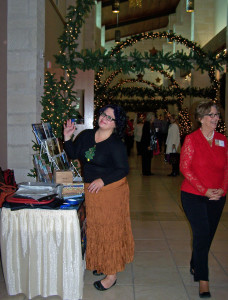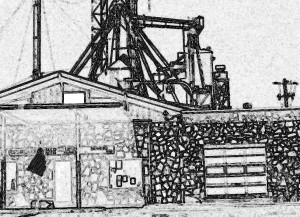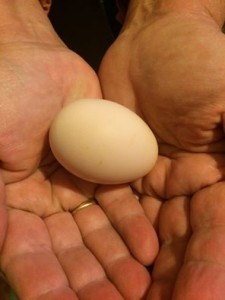This last weekend, I overheard two of the volunteers at the New Braunfels Weihnachtsmarkt commiserating on how the last two months of the year seem to go on rocket-powered skates. For them, the last two months of the year are spent sequentially at Wurstfest, early in November; at Weihnachtsmarkt in mid-November; Thanksgiving, which slaughters the last of the month, along with Christmas shopping in other venues firing up with a roar, then Christmas… This demolishes pretty much all of December, until one emerges in the New Year, exhausted, partied-out, gifted-out, volunteered-out, and with one’s checking account sobbing for mercy.
This is pretty much what Blondie and I will be doing, in support of my books and her origami and beading – and origami-plus-beading art – although we will have a short break over this week’s Thanksgiving break. This we will spend, sorting out the fence between ourselves and our neighbor to the immediate south, as the fence posts along that property line have disintegrated to the point where there is actually no connection at about soil-level between the concrete and the posts which supposedly uphold the fence. This is the stretch of fence that I replaced myself in about 2002 or 2003, over the Thanksgiving weekend, since the bulk trash pick-up in my fair city was conveniently scheduled for the week following …
Where was I? Oh, yes – the schedule and last weekend … they had decorated the hall through the Convention Center with seasonal arches, all lighted and seasonally adorned, and moved the Santa venue to one of the conference rooms adjacent to where I thought would be prime spot to have a table … alas, it would have only worked for someone having strictly children’s books of the ‘large picture and simple word’ style … although I did sell a set of Quivera Trail/Steel Roads to the energetically costumed couple who were doing St. Nicholas and Mrs. St. Nicholas for the entire weekend. I did OK with my books over the two days, but not so thick a traffic with the new releases as we had hoped. A number of sets of The Adelsverein Trilogy – which practically sold us out … but not so many of the new books as we had hoped, based on previous years. Blondie speculates that perhaps we have tapped-out the market in New Braunfels for a while.
So – on to the next events; Goliad with Christmas on the Square – which I love purely because that event is so small-town local. I’ve been coming back to it and back to it again; it’s a goodish drive, and on that one year that it was murderously cold, I didn’t sell a single book – but still. Much of the inspiration for Chronicles of Luna City came from stories that we heard there, or things we saw – like the lovely classic courthouse square. That will be Saturday, December 5th. Then, the following Sunday afternoon, it’s Chocolate and Santa at La Escondida Celebration Center in Helotes. The weekend after that – the 19th and 20th, back to Boerne Town Square for the Cowboy Christmas Market … and then we likely will collapse for the rest of the year, completely exhausted.
But then … I have to get cracking on finishing The Golden Road – the adventures of a wide-eyed teenaged Fredi Steinmetz in California during the gold rush. And more stories for another collection of Lone Star Sons, and yet more for Luna City.








Recent Comments